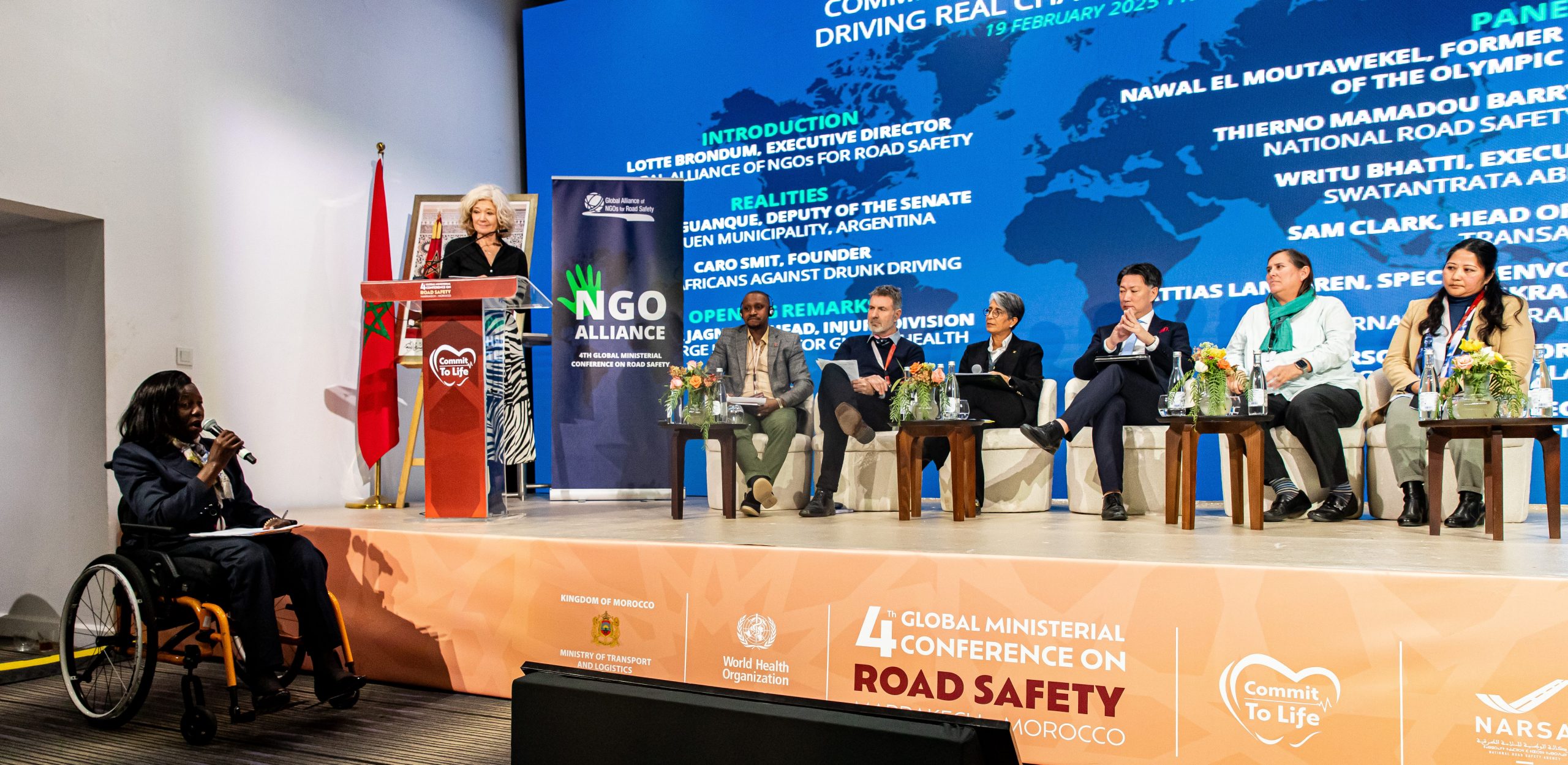
“Accountability brings progress. It keeps commitments. It is the bedrock on which sustainability stands.” – Jagnoor Jagnoor, the George Institute for International Health
The parallel session on why accountability matters in road safety conducted by the Alliance during the 4th Global Ministerial Conference on Road Safety in Marrakech demonstrated how clear commitments, robust data systems, and multi-stakeholder engagement can drive transformative change for road safety. The discussants included:
The parallel session highlighted the importance of accountability and commitment in achieving global road safety targets, using data to monitor and evaluate performance, and the importance of multi stakeholder engagement in navigating challenges in implementing road safety interventions. It also demonstrated the need to humanize road safety data using personal narratives on the realities of unsafe roads, using innovative tools to monitor accountability, and the need for overarching leadership for creating safer streets.
Panelists revealed strategies to ensure that commitments do not devolve into rhetoric, but translate into tangible actions. Some of the strategies include:
According to Kelly Larson, “If you can’t measure, you can’t evaluate. Having clear indicators is essential for the process to succeed. It is not enough to have commitments. We need indicators for these commitments. The global status report is an advocacy tool. Everyone needs to use it to do more. Using the examples of countries that have done things is one of the best ways to be able to say this can be done.”
To ensure data-driven monitoring and evaluation of road safety commitments and support implementation of evidence-based interventions, panellists suggested the following:
“You need to have strong leadership on road safety. It can’t work if everyone is not aligned,” says Mattias Landgren.
Panellists reiterated that collaboration amongst diverse actors across sectors can lead to a powerful, cohesive force that demands meaningful commitment and accountability for change.
It was highlighted that commitments for safer roads and the accountability required to follow through often face obstacles such as resource constraints, bureaucracies, and resistance to change. These challenges must be tackled not just by using targeted, innovative strategies but by strong political will to implement change.
The onus lies on the government to remove unnecessary bureaucracies when it comes to road safety and recognize that lives are at stake. Resources should be set aside specifically for road safety or existing ones reallocated appropriately towards ensuring safer streets. This should be backed by institutional reforms that enhance efficiency and accountability for on-the-ground improvements.
One of the panelists, Nawal El-Moutawakel, who won an Olympic gold medal gave a personal account of her experience from unsafe roads. She stated that “all my effort, the training, the resources; it was worth those 54 seconds of race. And I could not enjoy it with the only person who accompanied me all the way: my father. I cried before, during and after the race. That’s why I wanted to become the voice, loud and strong. We should all be aware of the impact that car crashes have on our society.”
Therefore, elevating individual experiences to humanize statistical data and generate a powerful emotional response that drives change could be a useful strategy. Personal stories, when shared actively, reveal the real-world consequences of policy gaps and inspire urgent action. These narratives transform abstract numbers into compelling calls for reform by illustrating how policy failures directly impact lives. The vivid accounts of loss and resilience galvanize public support, motivate policymakers to prioritize reforms, and embed a deep sense of accountability within communities.
It was highlighted that tools that rigorously track progress and enforce transparency should be adopted and continually refined in line with present realities as they are crucial for holding governments accountable.
“The Global Alliance has developed an extremely useful tool called the Accountability Toolkit. I started tracking progress with it around 2021 or 2022. This tool monitors the journey from commitment through resource allocation to implementation. It concretizes what is being demanded and allows us to hold governments accountable by asking why the commitments they made are not being fulfilled,” says Bright Oywaya.
It was highlighted that the Alliance Accountability Toolkit, the Global Status Report, and other mechanisms serve as practical instruments for setting benchmarks and identifying performance gaps. These tools are useful for facilitating swift corrective actions by providing a clear, data-backed roadmap for success. Their systematic use empowers NGOs, decision makers and other stakeholders to monitor every aspect of policy implementation, ensuring that commitments yield measurable and sustained positive outcomes.
Some leadership and advocacy roles highlighted from the panel discussion include:
Leadership drives policy reforms and galvanizes communities to participate actively in the change process. This collaborative approach ensures that every initiative carries the force needed to effect real, lasting improvements.